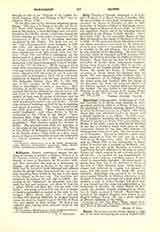

Bainbridge, CHRISTOPHER, Archbishop of York, and Cardinal, b. at Hilton, near Appleby, in Westmoreland, probably 1464; d. at Rome, July 14, 1514. He proceeded to Oxford, entering Queen’s College, of which he became provost in or before 1495, being about that time admitted LL.D.; he became later a liberal benefactor to his college. He held a number of benefices, including the treasurership of the Diocese of London, on Henry VII’s presentation, and Master of the Rolls, a post he held till his elevation to the See of Durham, which took place in 1507, nominated thereto by the king, who restored the temporalities of the see to him. He was consecrated on December 12. This see he held but a short while, being translated to York the next year by a papal Bull dated September 20, 1508. In 1509 he was sent by Henry VIII as his ambassador to Rome. Julius II created him a cardinal on March 10, 1511, giving him the title of St. Praxedis, in reward for negotiating Henry’s adherence to the pope as against France, for which country he felt a strong antipathy all his life. As cardinal he was commissioned by Julius to lead a military expedition against Ferrara, which he successfully besieged. He endeavored to secure from Pope Leo X the bestowal on Henry of the title of “Most Christian King” which Louis of France had forfeited by waging war against the pope; but the peace of 1514 made this project abortive. Bainbridge was poisoned by an Italian priest named Rinaldo de Modena, who acted as his steward or bursar, in revenge for a blow which the cardinal, a man of violent temper, had given him. It was hinted that the crime was perpetrated at the instigation of Sylvester de Giglis, Bishop of Worcester, the resident English ambassador at Rorne, but de Giglis exonerated himself. Bainbridge was buried in the English Hospice, now known as the English College, Rome. He was a stout upholder of Henry’s interests at the Curia.
HENRY N. BIRT

